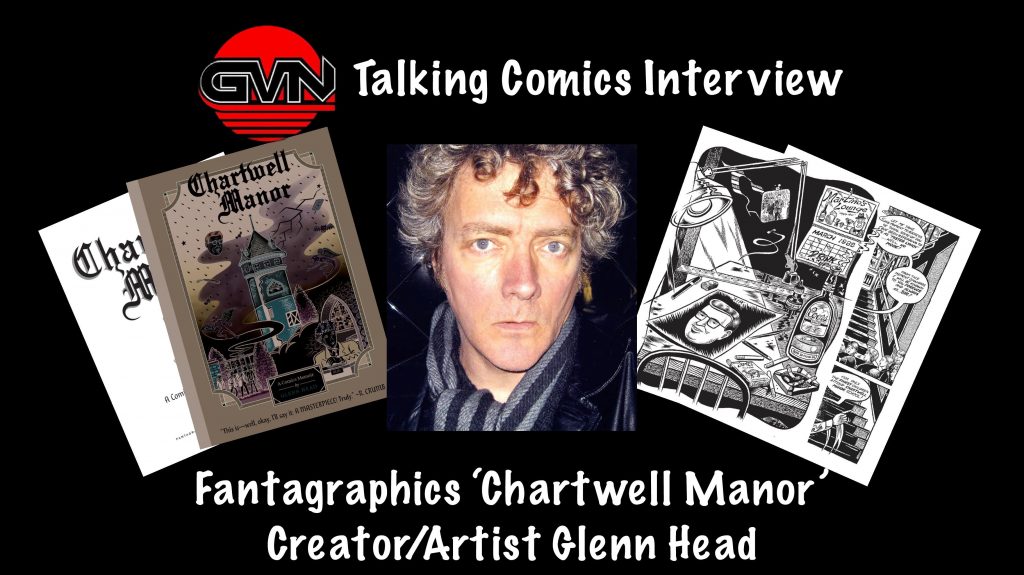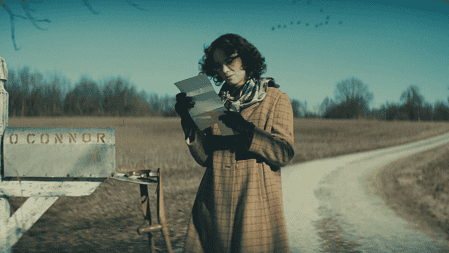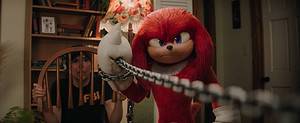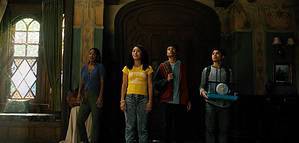Cartoonist Glenn Head has been putting out great surrealist art since his early days working on underground comics. He has contributed to many anthologies such as Bad News 1,2, and 3, Zero,Zero and the Eisner and Harvey award nominated Hot Wire Comics. He also created his epic graphic novel Chicago in addition to contributions to many major publications such as the Wall Street Journal, The New York Times, Playboy, New Republic, and Sports Illustrated. Recently however, he has created a very personal book that tells about his life and the two years he spent at Chartwell Manor. A now-defunct boarding school that was run by a serial sexual and physical abuser of young boys. The book is an honest and powerful examination of his life and how those years impacted him. So let’s welcome Glenn Head to GVN’s Talking Comics Interview.
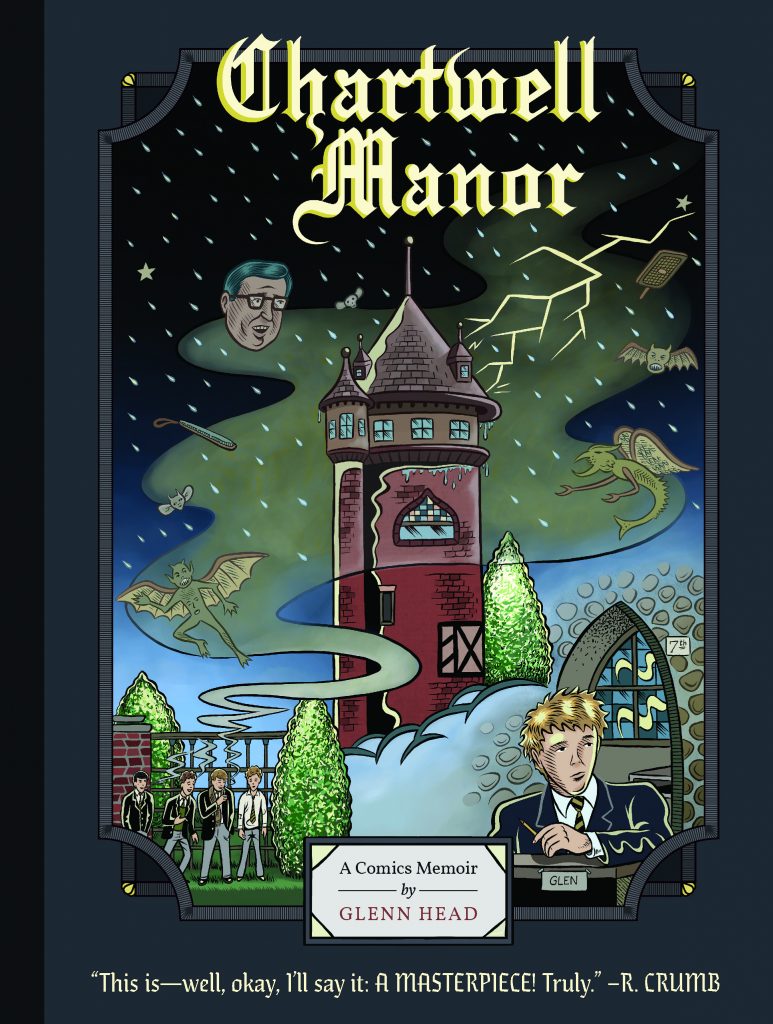
The Challenges of Chartwell Manor
GVN: Thanks for sharing a bit of your time, Glenn. Chartwell Manor is a very powerful book. You are to be commended for being so self-reflective about such a traumatic experience in your life and having the courage to put it out there. So how did you finally decide to take on that challenge and did you at any point during your work question if you were making the right choice?
GH: The challenge of drawing Chartwell Manor was really brewing in me from the time I got there, or maybe right after I left the place, when I was fifteen. My two years at Chartwell Manor were really like living in a weird gothic nightmare. This crazy British boarding school, with corporal punishment, bad food, crowding, adolescent male sexuality, and a pedophile headmaster, Terrence Michael Lynch, to top it off!
Look, people always ask me about the “therapeutic” aspect, the “healing power” of art. Well okay if that happens, terrific. But that’s not what I’m in it for. I mean, I’m really just trying to do my best work as a cartoonist. So how do I approach this ambition? Well, a great book demands a great character, or in this case, a great villain. And Lynch was definitely the closest thing to a demonic figure I’ve known. He’s actually comic: verbose, florid, conniving, dangerous. A charming sociopathic criminal.
I very rarely question whether I’ve made the right choice. If it feels true, if it is true, and it reads just like it actually happened, well, that’s all there is for me. And it better have a kick to it. It’s gotta move.
Reliving the Past
GVN: Well it certainly moved. As you worked on the book, did reliving the experiences give you any closure or perhaps allow you to understand your reactions or those of your friends or family? It would see most parents seem to deal better with things by NOT dealing with them. In truth, most PEOPLE use that method.
GH: No I don’t think I would use a word like closure, but to an extent it is laying things bare, which is a strange experience, because you’re right, most people deal with traumatic things by not dealing with them, or making light of them. It’s not like I would ever talk to my family about Chartwell Manor, what the place was like for me or other kids. And they would never ask. That’s how families often get along, by just, you know, “getting along”.
There may be those who wonder why I would even draw this book. Why relive that, and put it all on paper? Why not just try and forget it? Don’t get me wrong, I’m not a dark or hateful person, but there are those who would like others to “just go quietly” and not make a fuss. Chartwell Manor, the graphic novel, is my answer to them!
Art Reflections
GVN: I almost asked that question, so I appreciate you answering without me asking. As for your art, do you feel your experiences during and after Chartwell had a hand in shaping your art style? Would your style have perhaps been different had you not experienced what you did? This might not be a question you can answer. But most art is often reflective of the events in our lives.
GH: It’s hard for me to see how the experience of being at Chartwell actually effected my art style, except for the fact that I first saw underground comics when I was at the place. Maybe the juxtaposition of these weird, crazy events coinciding with reading these insane comics did a number on me… I don’t know.
But hey I can’t blame everything on that school. Or on comics! I actually think it’s my nature, I’m a very curious person, I’m going to want to see what’s happening underneath. And possibly that mindset affects my style. I don’t tend to like really slick art, it seems to be smoothing too much out. On the other hand really crude comics can just seem lazy. Some rough edges are fine. My work has a few. I like work that feels truthful. I feel I can tell if a cartoonist’s voice is genuine or contrived, derivative, or something that was arrived at honestly. But yeah it’s always down to it being truthful for me, that’s what I aspire to.
Working with Fantagraphics
GVN: That honesty shows, especially in this book. You are working with Fantagraphics on this novel. How has that collaboration went and how have they worked with you in the telling of your story?
GH: My collaboration with Fantagraphics was really really pretty simple. I just sent Eric Reynolds a mock-up of my book as it developed, so he could see how it was progressing and on it went. When it was completed Eric proofread it.
Where they really got heavily involved was in the book’s design and I loved what they did. The covers, the design of the first and last pages, the attention to detail… this book came out looking exactly as I hoped it would. I’m really very happy with the end result. I couldn’t ask for better.
This slideshow requires JavaScript.
Lessons Learned
GVN: What would you hope that readers might learn from your book? Is there any lesson that might be passed on or is that for the reader to discern?
GH: If they learn anything, anything positive, it’s that nothing has to stop you in your tracks. I firmly believe that an abuser’s wish is to destroy you, silence you. It doesn’t have to be a sexual abuser. It can take many forms. You don’t have to let that happen. Your life experiences are your own. Never let anyone else define you, categorize you, sum you up, put you in a box of their choosing. Fight anyone who tries. Never accept the world as others tell you it is. Find out for yourself.
GVN: Well, I know a great closing statement when I hear it. Thanks again, Glenn. Chartwell Manor is an emotional and evocative graphic novel and we will be following it with great interest.
GH: You’re welcome. Thank you for your intelligent and thoughtful questions.
Fantagraphics Chartwell Manor by Glenn Head comes out on May 25th where great graphic novels are sold. Definitely give this book a look as Glenn tells a powerful and self-reflective story with conviction, honesty and in his own iconic style. 🖖🏻

Senior Writer at GeekVibesNation – I am a 50 something child of the 70’s who admits to being a Star Trek/Star Wars/Comic Book junkie who once dove head first over a cliff (Ok, it was a small hill) to try to rescue his Fantastic Four comic from a watery grave. I am married to a lovely woman who is as crazy as I am and the proud parent of a 18 year old boy with autism. My wife and son are my real heroes.


